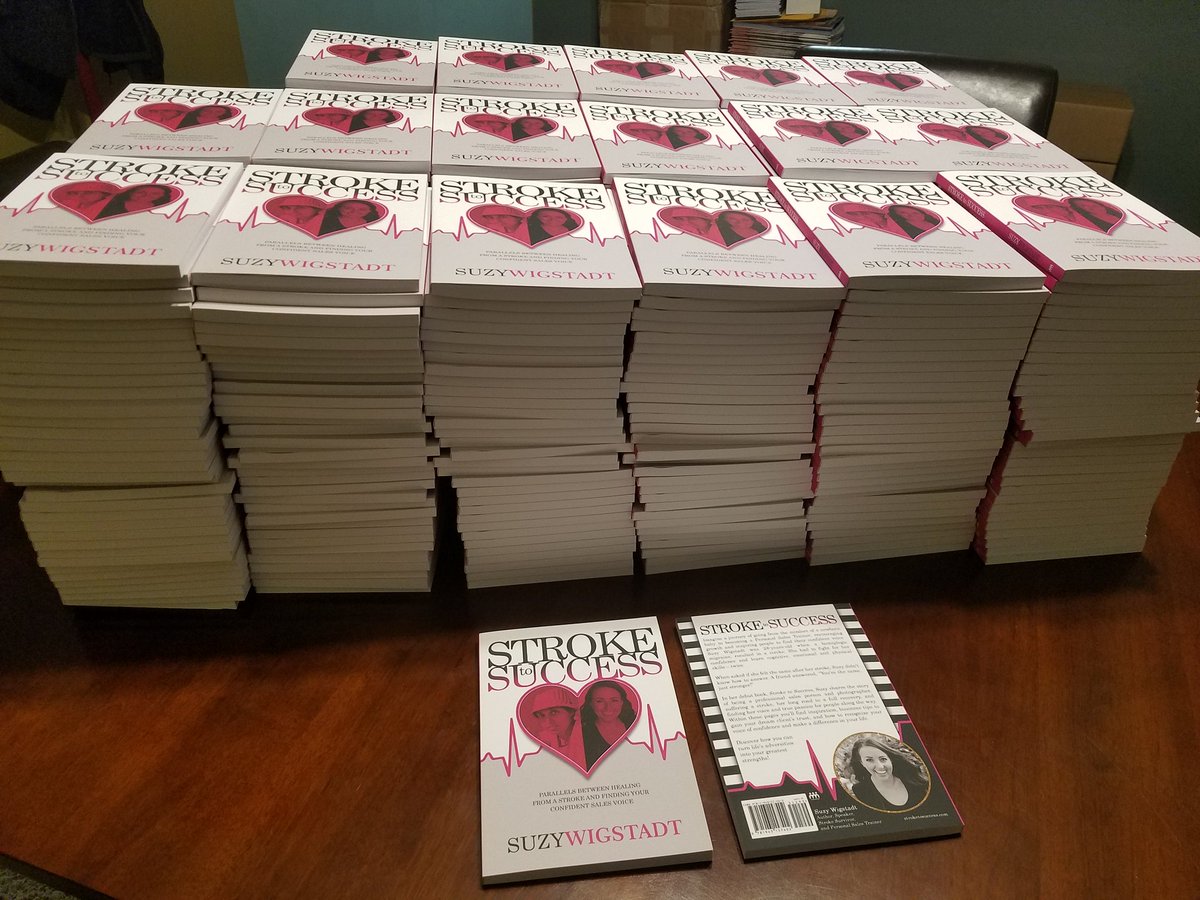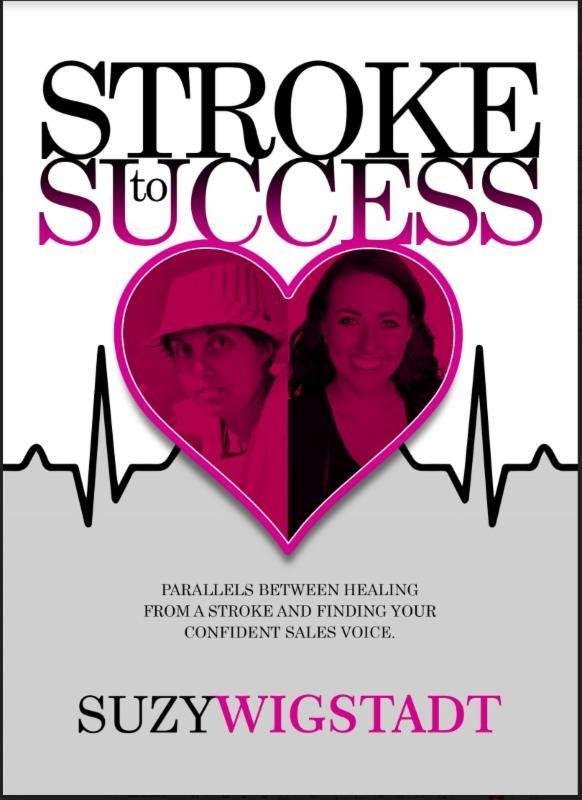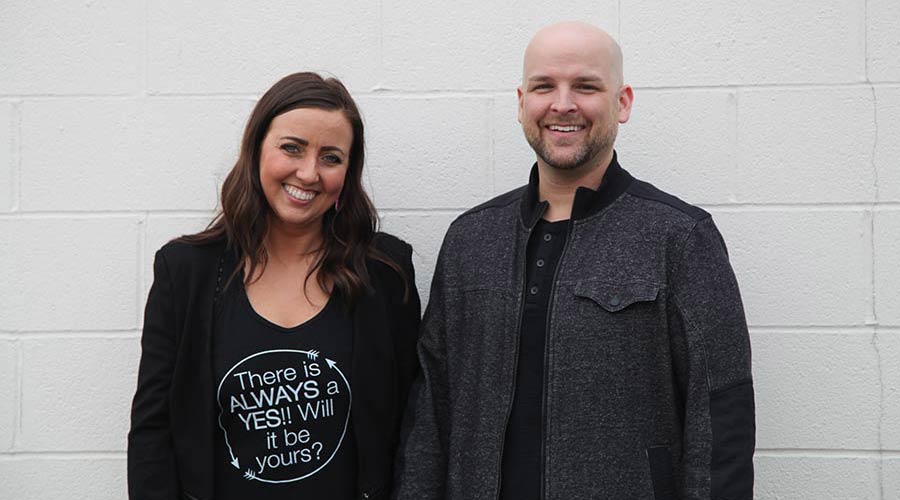Finding Success After Surviving a Stroke

Finding Success After Surviving a Stroke – Interview with Suzy Wigstadt
Many of us are lucky we never had to/have to transition through a life-altering accident, illness, or injury to emerge with a much greater amount of clarity, conviction, and confidence. In this instance, Suzy Wigstadt went through a pretty wicked stroke and emerged with a new perspective on ‘listening to your gut’ – and some insights that will help us all avoid making the same mistakes she did.
In this episode, I interview Suzy Wigstadt of Stroke to Success and she reveals her story of suffering a hemiplegic migraine that turned out to be a stroke, and waking up with the mind of newborn. She tells us about her recovery, her perspective, and her realization that it was time to start listening to her gut. Suzy is an amazing woman with an incredible story of overcoming and conquering, and it’s an honor to have her on the podcast. Take a listen and don’t forget to subscribe! [Subscribe Here]
Show Notes:
 Suzy Wigstadt – Stroke to Success
Suzy Wigstadt – Stroke to Success
Imagine a journey of going from the mindset of a newborn baby to becoming a Personal Sales Trainer, encouraging growth, and inspiring people to find their confident voice. Suzy Wigstadt was 28-years-old when a hemiplegic migraine resulted in a stroke. She had to fight for her confidence and learn cognitive, emotional, and physical skills – twice.
When asked if she felt the same after her stroke, Suzy didn’t know how to answer. A friend answered, “You’re the same, just stronger!”
In her debut book, Stroke to Success, you learn that the name is more than a brand – it’s a life story. It’s about overcoming, reading your intuition, and staying curious as you discover who you are after a life-altering change.
You can get her book on Amazon right now, and you can learn more about her speaks and training at her website, StrokeToSuccess.com.
Blake Hammerton – I know I’m definitely curious about the clarity and creation after the stroke, but for those that aren’t familiar with you, Suzy, we should probably start at the beginning. So without further delay, please welcome Suzy Wigstadt, it’s great to have you!
Suzy Wigstadt – It is so great to be here, Blake. Thank you so much for having me on your podcast. Just to start, the stroke happened because of a hemiplegic migraine, and I had been having them since I was about 5 years old. What would happen is half of my body would go paralyzed, where I couldn’t feel the right side of my body. My arm, my leg, my toes, my hand – it felt like someone else’s hand, and it was just appendages attached to my body.
So I’d get these paralyzing migraines every two year, beginning at 5 years old. So my family sort of got used to them. I went to the hospital, I had every test that could be done, and they would always just say I had abnormal brain pattern. (nothing you can really treat or do with that) They would then go to the conclusion that it was a migraine.
My parents just got used to the process when these would happen. All I would do is sleep for about two days, and then I’d be back to my normal self. When this happened in 2010, my family knew this time that something was different – that I wasn’t bouncing back. My mom called one of her nurse friends and asked, “how do we know when to take Suzy into the hospital?” Because I had been there so many times – a part of the situation was that I didn’t have insurance. I was in transition from a salaried position to a full commission position, so I didn’t have health insurance at the time. My parents didn’t want to take me to the hospital and put me in a bad situation, because normally I snap out of it.
After talking with her, my mom’s friend said, “if she starts throwing up, you know it’s bad, and you need to take her to the hospital.” So, of course, I started throwing up and we went to the hospital. I remember being driven to the hospital with the mindset of a newborn baby. I remember not being able to speak, not able to feel my right side, and feeling like this time was different.
BH – I can only imagine. See, I went through a horrible car accident, and that’s a completely different story though. I had similar things to what you experienced like aphasia and things like that, but mine lasted so much shorter than yours. Once my brain decided, hey, we’re not gonna die, we can start turning things back on, it all kind of recovered pretty quickly.
I think the thing I’m having trouble wrapping my head around is [I’m you now] I’m being driven to the hospital and I can’t speak, and I have the mind of a newborn, and this all new to me, and at the same time I feel like there would be this bit of maturity there that would feel like, “oh no this is bad, you are afraid.”
 SW – Yeah, and I think that by the time I got to the point where I didn’t know what was going on, I was in kind of a comatose state for about 5 days. It was more like a dream-like state, I would say – where half was reality and half was, wherever I was. Which is crazy. So there wasn’t ever any fear, it just felt different. It felt different than other times. It was more painful and different things than I was used to, and by the time I woke up in the hospital, I knew I wanted to communicate, but I couldn’t
SW – Yeah, and I think that by the time I got to the point where I didn’t know what was going on, I was in kind of a comatose state for about 5 days. It was more like a dream-like state, I would say – where half was reality and half was, wherever I was. Which is crazy. So there wasn’t ever any fear, it just felt different. It felt different than other times. It was more painful and different things than I was used to, and by the time I woke up in the hospital, I knew I wanted to communicate, but I couldn’t
In the hospital [because I couldn’t speak] all I could do was smile, wink, and take pictures. Because I was a photographer for 12 years –6 years before that incident, and 6 years after– so it was in me already that to let my family know I was okay was to smile, to wink, and to take pictures.
BH – What’s so cool about this story, and we haven’t talked about it, but it’s in her book, is that she’s at a wedding when this happens. She double booked a wedding with a friend of hers, and they’re just beginning the ceremony. things are just beginning to happen and she’s starts to get the tingle letting her know that something is happening. She’s telling herself, “no no no, not now” – fighting it the best she can. And then something in your brain says, “you know what, we’re going to have to sit down because this is not going to go away.”
And I have to put myself in that situation and put myself in that place in your shoes, right? SO alright, I’m at a wedding, I’m doing something important, I’m on someone else’s clock, this is a big deal, big day, AND I’m losing function in most of my body. What do I do now??
SW – Yes. In that time, typically, my mom and I would photograph weddings together. This time we were double booked, so I was photographing with my best friend instead. And it’s so crazy how it happened, because if my mom was there, she would have gone into Momma Bear mode and would have taken care of me. But because it was my best friend, she continued with the wedding so everything was taken care of.
My sister was AT the wedding I was shooting and recognized what was happening, because she’s seen me get these since I was five. The groom is a doctor, so he left the reception –he left his bride’s side– to come out and check my vitals when I was outside in the car. I mean, it’s crazy!
So it was interesting because the Bride was walking down the aisle, and the tingling started to happen, and I’m thinking to myself, “no, not now. This is now happening.” And the thing is, sometimes I could rest and it would go away for a bit, and sometimes it wouldn’t. During all this time, I was working about 100 hours per week, working 3 paying jobs and trying to build a website for my photography business, and was only getting about four hours of sleep. I was just not listening to my body. My body told me for about 3 months, through daily migraines, to take care of myself, and I ignored it. So my body stopped for me.
BH – Yes, and this is something all my listeners and readers, you know 93% of them are men, we are awesome at being workhorses and stubborn. The deal with us is we don’t decide when we have a goal to take some time off or take some time for ourselves – no, we push through it. We don’t quit, we suck it up and drive it on. So yours is a similar story where your body is trying to tell you so slow down and then it does it for you. We’ll hear our body say, “look dude, you have about 20 more minutes before I shut this thing down and you wake up in the hospital.” And yet, we still don’t listen.
SW – Exactly. [laughs] That’s exactly what it was for 3 months of migraines. I was popping medicine every day. I was having 1-2 5 Hour Energy drinks every single day, and just not paying attention, not taking care of myself, not listening to my gut. And I believe (through life experience) that our heart knows before our mind understands. When we learn to listen our gut –listen to our heart– especially guys, this is not being sappy or anything, if you feel something in your gut, listen to it, respond to it, because there’s a reason for it.
BH – Totally agree. I cannot argue with that and I cannot push that enough. It is a great point. We are so good at being logical and thinking our way in and out of stuff, and looking back and say, “man, something felt weird then, but meh, hindsight’s 20/20, right?” You can’t just discount your gut from the beginning. You should have listened to it – imagine what your life would be like…
SW – And to add to that, I am so thankful to be on here today because I know I went through this whole ordeal to help encourage and inspire other people. I didn’t do this [listen to my gut] but now I get a chance to. And now I get to share it with people. So anyone who’s listening and is thinking, “oh, I couldn’t do this, or I should do that, or I shouldn’t do this,” – Why not? Why not you? Why not now?
Why not take the time now to listen to your gut and do what you’re meant to do? One of the things now I feel like I’m able to do is draw out confidence, strength, and determination for people to be exactly who they’re meant to be. If there’s something people are thinking about doing or not doing, I invite them to listen. Take the step or take the action – or stop doing whatever it is you know you need to stop.
I believe that men don’t hear enough, as women don’t, but men don’t hear enough that you’re worth more. You’re worth more than just being a workhorse, and you’re worth more than providing and getting through the day.
 BH – Well that’s nice. On behalf of all men, thank you.
BH – Well that’s nice. On behalf of all men, thank you.
SW – Yeah! [laughs] A lot of times most guys don’t go to the emotional side, you know… but no matter what, just know that you’re worth more to the world around you. So whatever it is in the world around you, family, work, friendship, your dog, cat, whatever, you’re worth more.
BH – Right on! You’ve definitely dot this perspective of coming in with some inspiration and the idea that the world should wake up and start listening to our guts and our bodies, because if we do, we’ll start making different choices, better choices. We’ll start elevating our game as humans because we’re worth more, we can have, do, and be more of an impact if we just stopped for a second and listened. We can take action from that place. Is this where the sales trainer position came in? You moved into that realm because you’re trying to bring heart back into business? Tell me about that.
SW – Yes, so going back to the timeline of my career, I started in sales and didn’t even know I was doing it. Growing up without confidence, I learned to connect with people. Other people saw me as a salesperson, and they put me in a sales position. I learned that confidence is a muscle. I learn that as I did more, I had more of it.
BH – That’s awesome! Let’s repeat that for the listeners. So as you did more, you had more.
SW – Yes. As I did more, I had more confidence – even though I started with none. My sister flew out of the womb with confidence, and I had to build mine, you know? So I had to learn that. I got my first account executive position when I was 21 and quickly earned top sales awards. I was working for a title company that was doing 60 loans a month, and I was bringing those in. The reason it was all happening is I was out there building relationships and I got addicted to that, and I was a work-a-holic, and I wasn’t paying attention to my body.
When the stroke happened I had to step back to making $8 an hour and only working 20 hours per week in a baby room. So as I was healing, I was able to take the time to pay attention and take care of myself, but I was really starting to get the itch for a sales position and connecting with people again. I stepped out and got back into a sales position and ended up losing that job, but a friend of mine said, Suzy, why don’t you become a business coach?
 I had helped her a lot with her business website and that started the whole idea. Instead of working for one person and building their business and only getting a commission, why don’t I try and help as many people as I can with their business, and give them the skills to be able to go and build their dreams? Rather than just me build one person’s dream, why not help build hundreds or thousands of other people’s dreams – whatever that looks like – using the skills I had to use once, and I had to relearn after the stroke.
I had helped her a lot with her business website and that started the whole idea. Instead of working for one person and building their business and only getting a commission, why don’t I try and help as many people as I can with their business, and give them the skills to be able to go and build their dreams? Rather than just me build one person’s dream, why not help build hundreds or thousands of other people’s dreams – whatever that looks like – using the skills I had to use once, and I had to relearn after the stroke.
BH – Right! It almost feels like you get that second chance. You know, it’s like we always say when you start your life, you don’t really know what you’re doing until you become self-aware much later. If you knew when you were 15 what you know when you’re 30, your life would be very different, right? So it almost feels like going through this and having to start from the bottom in the baby room at $8 an hour, and moving through your recovery, it’s like you’re more equipped to launch Suzy 2.0. It feels like there’s no way you can fail because you’re going ot do it from the right place now…
SW – Exactly. Exactly. And now I get to share that with other people. I get to share what I learned as a 21 year old until the stroke at 28, and then again as a 30 year old until today. I get to share the things that I got to learn twice so I can help people not make the same mistakes I made.
BH – Right on. Good. So as we start getting into the future ideas, what is the big, hairy, audacious goal for you and Stroke to Success?
SW – The big, hairy, audacious goal is honestly to speak in front of thousands. We’re actually starting a tour called “You Are Exactly Who Your World Needs” and we have a plan and structure for it, and we’d love to take it nationwide. Because there aren’t enough people that know that and believe it. The book is a way to do that, the book is a tool to get there, but really, we want to speak to doctors, chiropractors, photographers, salespeople, directors, and early childhood educators, etc.
Because when we live believing that we are exactly who our world needs, then the world is changed. But when we shrink back, then the world goes without. When we shrink back our world goes without, so the world at large goes without.
 BH – Exactly. And that plays into what Chas Wilson, the co-founder and CEO of Master Networks, says about, you know, it is your duty to make money and be successful. People have this idea that they can only be so successful and earn a bit of money because after that, it may become greedy and change them. He argues that no, it’s not about the money – it’s about the success you allow yourself to achieve.
BH – Exactly. And that plays into what Chas Wilson, the co-founder and CEO of Master Networks, says about, you know, it is your duty to make money and be successful. People have this idea that they can only be so successful and earn a bit of money because after that, it may become greedy and change them. He argues that no, it’s not about the money – it’s about the success you allow yourself to achieve.
Look, money is just an amplifier. If you believe money is evil and you’re evil, then you don’t want to get too much because you’ll make yourself worse. But if you’re a good person and we give you $10k, you’ll do $10k worth of good. If we give you $10M, you’ll do $10 Million worth of good. So it is your duty to be successful because people are looking to you as an example, and for guidance. So if you’re out in the world – especially if you’re trying to make the world better, it is your duty to pursue success and expand your horizon so you can help other people expand theirs. By not doing that, you’re doing the whole world a disservice.
SW – Absolutely. Actually, Chas Wilson gave me the name too. He said, “why don’t you call your book, Stroke to Success?” So that’s where the book name and our business name came from. You saying it’s your duty to be successful – that’s exactly what it is. I remember seeing Chad Hymas earlier this year and he said:
“Your dreams do not come true despite your challenges, but because of them.”
And that, changed my life. Because that’s exactly what Stroke to Success is.
BH – Right on! So if you could give us as the listeners here a gift, a nugget, or an insight that could impact us all forever, what would that be?
SW – I would say really simply to listen to your gut. To know you’re exactly who your world needs and to not shrink back because they’ll go without.
BH – Excellent. And as a fairly Emotionally Intelligent guy, the first part I get and I can also see where a lot of listeners will hear it and say, “I don’t need to be where I am now, I want more” – but, the idea that if we shrink back the world will go without is something we can all relate to. We’ve all been in situations where we’re building something and we get knocked down a peg and we shrink back.
We think it’s just retreating and regrouping, but really it’s shrinking back and we stay there for way too long. We have to fight that urge. We have to stay out because when we shrink back the world goes without and that’s a disservice to the world. I love that!
 SW – I would like to add this –because I just got this thought– many times in a relationship, a woman will start an idea, and it takes a little longer for the guy to come around and grab onto it. If you, as men, get the idea to do something or be someone, I encourage you to step out and step up, and the people you need will come around you. When we think of things, the way to do it already exists.
SW – I would like to add this –because I just got this thought– many times in a relationship, a woman will start an idea, and it takes a little longer for the guy to come around and grab onto it. If you, as men, get the idea to do something or be someone, I encourage you to step out and step up, and the people you need will come around you. When we think of things, the way to do it already exists.
So as men, when you get an idea, step out and step up. It’s amazing when my fiancée steps up with ideas. It is the best thing in the world! Where it’s not me thinking of something and letting him think that it’s his idea… [laughs] when it’s actually his idea and I just buy in right away!
BH – Well, and Brian is a savvy bald, bearded man like myself, so we automatically know he’s very smart. He’s definitely got things going on upstairs. You’re safe there!
So Suzy, thank you so much for being on this episode with me, this has been excellent. For all the listeners out there, the book is called Stroke to Success, it’s the parallels between healing from a stroke and finding your confident sales voice. It may not make sense in that little snippet, but once you read the book, you’ll see how much sense it makes and how applicable it all is!
Remember gentlemen, as you move forward with your life and your endeavors, spend more time thinking with your gut and less with your head. Half the men I speak to tell me they wish they could get out of their heads. You don’t want to be at the end of your life saying, “man, I wish I had thought about it less and just done more.”
So what will you do differently to get out of your head?
How do you KNOW when to trust your gut? What do you think of Suzy’s story?
Share in the comments below so we can connect!




